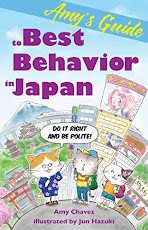I've always gotten along well with my neighbors on the island. This is especially important because my neighbors are all gods: the Mountain God, Kompira-san, Juichimen Kannon, Senju Kannon and Myoken-sama. I have to put up with a few loud parties every now and then, but overall, we get along extremely well.
And oh, the parties! I seem to be surrounded by party gods. The Mountain God has a party twice a year when the whole neighborhood is invited to come socialize at his shrine in the side of the mountain. Sutras are chanted, hands are clapped, sake bottles are opened.
Kompira-san, god of seafaring and fishing, has a block party that is part of the autumn festival, when he invites the entire island. The road is closed off and we just drink and celebrate. Other gods are invited to that one too, so it's quite an eclectic mix. I've never seen any of the attending gods myself, but I am assured they are present. The other gods are only invited once a year and no one would dare miss a party of Kompira-san's.
The little stone gods Juichimen Kannon and Senju Kannon, who live in the shrine on the pilgrimage route behind my house, are the quietest. They don't hold any parties at all. They do receive individual guests, however, who tend to throw their money around while saying "Om, bazara tarama kiriku!" which roughly translates to, "Om, the lord of delivering the imperishable Dharma and its purity!."
But Myoken-sama has the most exclusive party of them all — black tie and invitation only. No women allowed either; this is secret men's business. The Myoken-sama matsuri takes place every June. It is not on the same day every year but instead is held according to the lunar calendar. Never really knowing when it will be is always part of the mystique of this festival. The only clue I have is that the day before the festival, women arrive with brooms and rakes to clear the path up to Myoken Shrine. There is further activity as banners and other decorations are carried up the mountain and put in place around the shrine.
On the day of the celebration, about 20 guests arrive in cars and park in a long line along the port. All dressed in black suits and freshly polished shoes, the men carry fresh whole fish and kagami mochi on trays up the stone steps that lead to the shrine. These men are anywhere from 40 to 80 years old, some carrying large bottles of sake, because everyone knows that the Shinto gods have alcoholic tendencies. It's comforting to know that you never have to drink alone in Japan. Myoken-sama overlooks the port and protects the boats coming in and out. The shrine was built around the same time the port was finished, about 400 years ago. Myoken-sama also, for some reason, protects us against cholera (hey, why not?).
I wonder how exactly Myoken-sama and the other gods protect us anyway. Has anyone ever thought about this? Can they see cholera in the distance, sprinting to the island? And what kind of divine intervention is used to convince the cholera to stop before it gets here? Is plea bargaining a possibility? Perhaps we all end up with just a bad cold instead.
No one really knows. We just know that they, like all the gods on this island, protect us.
So my next question is: Why are we so sure the gods like us? After all, we pilfer their sea and turn their beaches into concrete walls. Why do we think we are so worthy of protection? I live on a piece of reclaimed land that didn't even exist until someone bulldozed the idea of turning a happy fish paradise into a plot of land for two houses. This land is not a part of the sacred Mother Earth. More like an artificial, test tube baby version.
And Myoken-sama — peace keeper, divine vaccine producer, and lawyer extraordinaire — is supposed to protect us from the wrath of the gods? I am under no false beliefs that my neighbors should hold me in such high esteem.
Just ask Juichimen (11-headed) Kannon and Senju (1,000-armed) Kannon, who live just out my back door. They've been sitting there with their legs crossed for over 400 years, with no apparent leg pain, so I know they really are gods. Who else could do that? I can only guess at how they feel living next to us mortals.
Juichimen: "Ugh, they're hanging out their laundry again — so much for our view!"
Senju: "Look at the holes in those pajamas! Why don't they just throw them away?"
Juichimen: "You can't expect them to be so smart. They only have one head."
But maybe the gods should be thankful that they have us to protect. Some islands in the Seto Inland Sea have lost their populations completely, and consequently have let their shrines become neglected and fall into disrepair. There are some parts of the country like that where the Japanese have abandoned their gods.
So while the benevolent gods continue to protect us, I wonder if it's not us who should be protecting them.





No comments:
Post a Comment